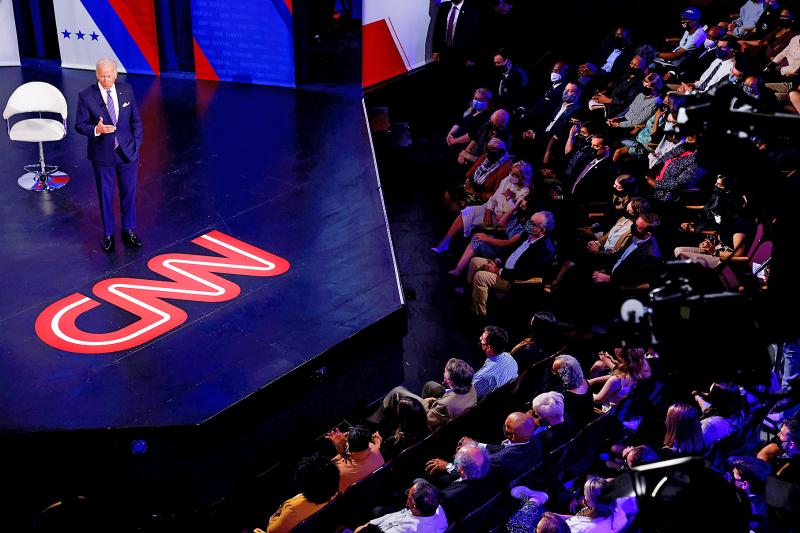The US would come to Taiwan’s defense and has a commitment to defend the nation China claims as its own, US President Joe Biden said on Thursday, although the White House later said there was no change in policy toward Taiwan.
“Yes, we have a commitment to do that,” Biden said at a CNN town hall meeting when asked if the US would come to the defense of Taiwan, which has been facing mounting military and political pressure from Beijing to accept Chinese sovereignty.
While Washington is required by law to provide Taiwan with the means to defend itself, it has long followed a policy of “strategic ambiguity” on whether it would intervene militarily to protect Taiwan in the event of a Chinese attack.

Photo: Reuters
In August, a Biden administration official said US policy on Taiwan had not changed, after the president appeared to suggest the US would defend the nation if it were attacked.
A White House spokesperson said Biden at his town hall was not announcing any change in US policy and “there is no change in our policy,” but declined further comment when asked if Biden had misspoken.
“The US defense relationship with Taiwan is guided by the Taiwan Relations Act. We will uphold our commitment under the act, we will continue to support Taiwan’s self-defense, and we will continue to oppose any unilateral changes to the status quo,” the spokesperson said.
Biden said people should not worry about Washington’s military resolve, because “China, Russia and the rest of the world knows we’re the most powerful military in the history of the world.”
“What you do have to worry about is whether or not they’re going to engage in activities that would put them in a position where they may make a serious mistake,” Biden said.
“I don’t want a cold war with China. I just want China to understand that we’re not going to step back, that we’re not going to change any of our views,” he added.
In Taipei, the Presidential Office, responding to Biden’s remarks, said its position remains the same, which is it would neither give in to pressure nor “rashly advance” when it receives support.
Taiwan will show a firm determination to defend itself, Presidential Office spokesman Xavier Chang (張惇涵) said in a statement, adding that Taipei recognized the Biden administration’s actions to show “rock-solid” support for Taiwan.
Taiwan would continue to demonstrate its resolve to defend itself and work with like-minded countries to contribute to peace and stability across the Taiwan Strait and in the Indo-Pacific region, he added.
In Beijing, Chinese Ministry of Foreign Affairs spokesman Wang Wenbin (汪文斌) yesterday said “there is no room for China to compromise or make concessions, and no one should underestimate the strong determination, firm will and strong ability of the Chinese people to defend national sovereignty and territorial integrity.”
Additional reporting by Lee Hsin-fang and AP

MAKING WAVES: China’s maritime militia could become a nontraditional threat in war, clogging up shipping lanes to prevent US or Japanese intervention, a report said About 1,900 Chinese ships flying flags of convenience and fishing vessels that participated in China’s military exercises around Taiwan last month and in January last year have been listed for monitoring, Coast Guard Administration (CGA) Deputy Director-General Hsieh Ching-chin (謝慶欽) said yesterday. Following amendments to the Commercial Port Act (商港法) and the Law of Ships (船舶法) last month, the CGA can designate possible berthing areas or deny ports of call for vessels suspected of loitering around areas where undersea cables can be accessed, Oceans Affairs Council Minister Kuan Bi-ling (管碧玲) said. The list of suspected ships, originally 300, had risen to about

DAREDEVIL: Honnold said it had always been a dream of his to climb Taipei 101, while a Netflix producer said the skyscraper was ‘a real icon of this country’ US climber Alex Honnold yesterday took on Taiwan’s tallest building, becoming the first person to scale Taipei 101 without a rope, harness or safety net. Hundreds of spectators gathered at the base of the 101-story skyscraper to watch Honnold, 40, embark on his daredevil feat, which was also broadcast live on Netflix. Dressed in a red T-shirt and yellow custom-made climbing shoes, Honnold swiftly moved up the southeast face of the glass and steel building. At one point, he stepped onto a platform midway up to wave down at fans and onlookers who were taking photos. People watching from inside

Japan’s strategic alliance with the US would collapse if Tokyo were to turn away from a conflict in Taiwan, Japanese Prime Minister Sanae Takaichi said yesterday, but distanced herself from previous comments that suggested a possible military response in such an event. Takaichi expressed her latest views on a nationally broadcast TV program late on Monday, where an opposition party leader criticized her for igniting tensions with China with the earlier remarks. Ties between Japan and China have sunk to the worst level in years after Takaichi said in November that a hypothetical Chinese attack on Taiwan could bring about a Japanese

STREAMLINED: The dedicated funding would allow the US to transfer equipment to Taiwan when needed and order upgraded replacements for stockpiles, a source said The US House of Representatives on Thursday passed a defense appropriations bill totaling US$838.7 billion, of which US$1 billion is to be allocated to reinforcing security cooperation with Taiwan and US$150 million to replace defense articles provided to the nation. These are part of the Consolidated Appropriation Act, which the US House yesterday passed with 341 votes in favor and 88 against. The act must be passed by the US Senate before Friday next week to avoid another government shutdown. The US House Committee on Appropriations on Monday unveiled the act, saying that it allocates US$1 billion for the Taiwan Security Cooperation Initiative